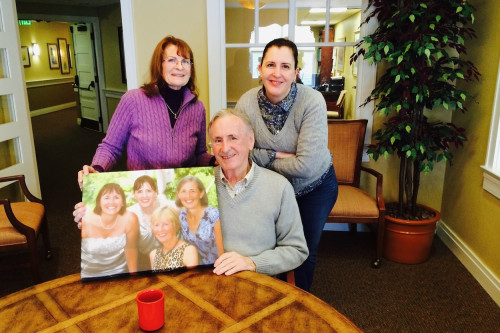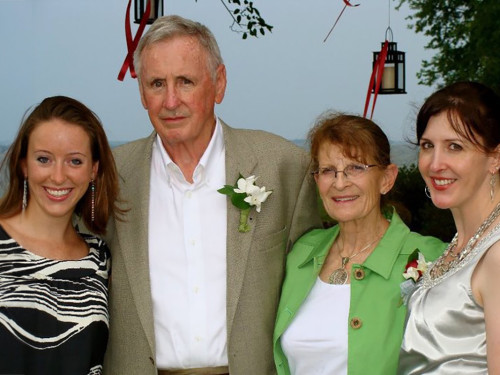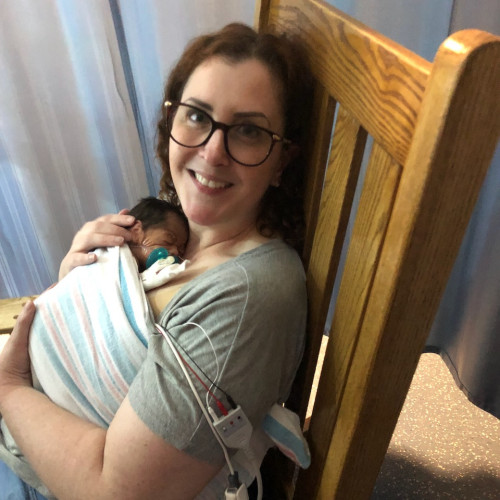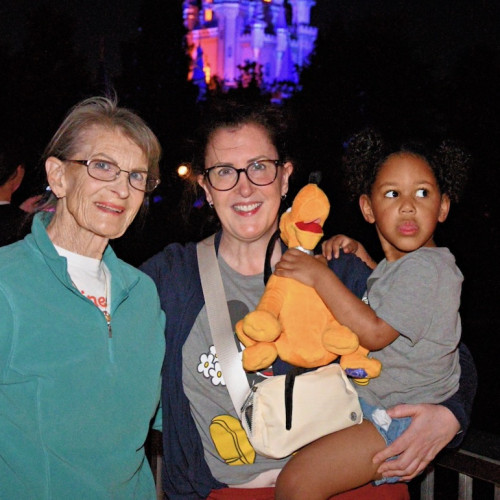"[A Sewanee education] gives you the ability to hold a conversation with anybody, cover any subject, recognize something in common, and treat people with compassion and respect."

Kelly Kilmartin, C’90, says her late father, David Kilmartin, thoroughly enjoyed his Sewanee experience, though he didn’t attend the University. After graduating from high school at age 17, David enlisted in the Navy. Following his service, he joined the family business, Kilmartin Tool Company, while supporting his own young family. Professional and personal obligations left him no time to pursue an undergraduate degree. “I think Dad experienced his college days vicariously through me,” Kelly says. Recently, Kelly and her mother, Betsey Kilmartin, chose to dissolve their family’s charitable foundation and used a portion of the funds to create the David, Betsey, and Kelly-Erin Kilmartin Family Endowment for the Sewanee Fund. “Philanthropy has always been a joint effort between me and my parents,” Kelly says, noting that she considers her Sewanee legacy to be “my dad’s legacy too. None of this would be possible without him.”
As a native Rhode Islander, Kilmartin says she grew up assuming she’d go to college in New England. Her mind changed one day during her junior year of high school, when her mother met her after school with a stack of college brochures, including a pamphlet about Sewanee. “I kind of chuckled at the name ‘Sewanee,’ and then I flipped [the brochure] over,” she says. On the back, she saw photos of students in gowns walking by Guerry Garth. “I was kind of like, ‘Wait. What’s this? A thousand students and a 13,000-acre campus? And the English Department is the best thing? Hold on. We’ve got something here.”
Once enrolled, Kilmartin quickly decided to major in English. “My mom always said I was a member of the book-and-a-half a day club.” She says her early favorite authors included Shakespeare and “any of the Irish poets.” She also enjoyed William Faulker’s novels, particularly The Sound and the Fury. “I remember loving how confusing it was. To me, it made sense.”
Outside the classroom, Kilmartin found her niche in Sewanee’s equestrian program and as a member of the University Choir, as well as a sacristan at All Saints’ Chapel. Having grown up on an expansive horse farm, she says riding at Sewanee felt natural. She notes that her parents bred and trained Arabian horses during her early childhood, and her mother, Betsey, was “a passionate horse trainer” who spent years competing in dressage and judging in national competitions. In 2004, the Kilmartins supported the renovation of the University’s equestrian center, and one of the stalls is dedicated in Kelly’s name.

with niece, Marcia Eslami (left)
Music was also part of Kilmartin’s upbringing—as a child, she sang at her church and participated in Rhode Island’s youth symphony. During high school, she played in her school band and wind ensemble. “I basically played any instrument I picked up.” On campus, serving as a sacristan and singing provided a sense of calm, as she describes it. “Choir could save your sanity—as tired as you might be on a Sunday morning, or not in the mood to go [to church], sitting for 90 minutes and being able to sing with friends made a world of difference. It was stress relief, and [choir] was where so many of my college friendships came from.”
Choir also introduced Kilmartin to two important Sewanee mentors: retired Professor of Music and University Organist and Choirmaster Robbe Delcamp and the Very Rev. Dr. Sam Lloyd, H’96, former University chaplain and regent. “[Delcamp] was absolutely the most fun ever to sing with,” she says. “He’s brilliant.” She recalls providing Lloyd with a mischievous greeting during his first year at the University. “When Sam came to be our chaplain, he unfortunately got a very warm welcome in the form of a sacristan prank.” In the moments before Lloyd delivered his first sermon at All Saints’ Chapel, Kilmartin says, “I went to put his sermon notes on the pulpit, and I put a little piece of cheese wrapped up in clingfilm next to [the sermon], with a note that said: ‘Some cheese to go with your bread and wine.’” Somehow, she adds, Lloyd figured out she was the culprit. After the service, he approached her with a smile, “and he said, ‘I need to speak to a certain little mouse.’”
Several years later, when Kilmartin was in Boston for a conference, she stopped by Trinity Church to see if she could spot Lloyd—who, by that time, was serving as the church’s rector. “I crept into the back of Trinity, and he was up front with someone at the altar,” she says. “I didn’t want to intrude, so I was standing at the back, and all of a sudden, this voice bellows out: ‘Kelly Kilmartin! Will you come up here and give me a hug?’” She says she was “hit sideways” by Lloyd’s death in 2022. “An amazing man. Absolutely amazing.”
After graduating from Sewanee, Kilmartin earned a J.D. from Washington and Lee University and passed the bar exam, but found she didn’t have a passion for legal practice. Instead, she experimented with several careers before discovering a vocation in nursing. Inspired by a friend who provided nursing support in Haiti following the country’s massive earthquake, Kilmartin completed prerequisites for nursing school while working part-time. In 2012, she received a B.S. in nursing from Rhode Island College and started a position in Rhode Island Hospital’s inpatient oncology ward. “I didn’t think it was going to be a good fit, and it ended up being the perfect fit.”
Liberal arts coursework might not seem relevant to nursing, but Kilmartin says her Sewanee experience served her well during medical rounds. “[A Sewanee education] gives you the ability to hold a conversation with anybody, cover any subject, recognize something in common, and to treat people with compassion and respect.” As a medical care provider, she says, she took a holistic perspective. “I’m not interested in the disease. I’m interested in the person and how the disease affects that particular person. I never wanted to see anyone as just a disease.”

In early 2017, Kilmartin’s father, David, entered hospice care, and she stepped back from nursing. Prior to David’s illness, she experienced a profound loss—her foster daughter, whom she raised from birth to age 17 months, was taken away after custody was awarded to one of the child’s out-of-state biological relatives. Not long after her father’s passing, her mother was diagnosed with acute lymphoma. This combination of extreme hardships took a toll, Kilmartin says. “Trauma changes you—it changes your brain. I started having problems staying focused on things.” After caring for Betsey through chemotherapy, and then navigating the challenges of the COVID-19 pandemic, Kilmartin is currently focusing on creative writing. In 2019, she adopted her now four-year-old daughter. “It’s now my journey to be a mom and to find my next thing to do,” she says.
Supporting the University has been an easy choice, Kilmartin says, noting that her father championed education throughout his life. “He helped friends finish college, and he did the same thing for his employees—he encouraged them to get additional degrees because he could see their talent.” From a small family business, David successfully grew Kilmartin Tool Company to Kilmartin Industries Inc., a nine-acre manufacturing facility located in Attleboro, Massachusetts. Among the items produced by the facility were “a majority of [U.S.] transit tokens,” Kelly says. “It was the largest privately owned mint in the U.S., at the time.” In the late 1990s, as smart card technology was becoming more prevalent, Kelly advised her father to sell the business. “I said, ‘Let’s get out now,’ and it was probably the best decision he made. He was able to sell the business to a conglomerate. Sure enough, within a year of him stepping aside as an advisor after the sale, everything changed.”

Kelly and Betsey worked with Advancement Officer John Whaling, C’07, in deciding to designate their gift for the Sewanee Fund. Kelly says she and her mother found the fund’s flexibility appealing. Because Sewanee Fund contributions help cover the University’s most pressing needs, gifts can be used “[to purchase] a computer for a student who needs a computer. Or to assist a professor who wants to bring a certain lecture or piece of equipment [to the University],” Kelly says. “Funding can be for a special program or opportunity. There’s that flexibility of possibility.”
Whaling commends Kelly and Betsey for their open-minded approach to giving. “We often talk about the ‘Sewanee family,’ and Kelly and Betsey truly support the University in the way you might support a family member—offering tremendous generosity with no strings attached. It’s an exceptional gesture of gratitude for their relationship with the Domain.”
Kelly says her parents spent as much time on the Mountain as possible during her undergraduate years. “They came down for every single Parents’ Weekend and had such a blast.” She believes her father would be just as excited about the University today as he was when she was a student. “I know he would be so proud of Sewanee. He loved Sewanee.”

